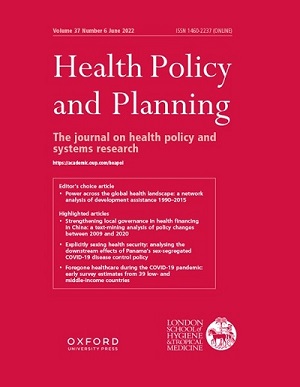2022-06-21
中文标题:长期护理保险对医疗服务利用和支出的影响评估:基于中国的实证研究
来源:Health Policy and Planning, Volume 37, Issue 6, June 2022, Pages 717–727


陈鹤|中国十大娱乐赌博城网址副教授
Abstract
Long-term care insurance (LTCI) is one of the important institutional responses to the growing care needs of the ageing population. Although previous studies have evaluated the impacts of LTCI on health care utilization and expenditure in developed countries, whether such impacts exist in developing countries is unknown. The Chinese government has initiated policy experimentation on LTCI to cope with the growing and unmet need for aged care. Employing a quasi-experiment design, this study aims to examine the policy treatment effect of LTCI on health care utilization and out-of-pocket health expenditure (OOP) in China. The Propensity Score Matching with difference-in-difference approach was used to analyse the data obtained from four waves of China Health and Retirement Longitudinal Study. Our findings indicate that, in the aspect of health care utilization, the introduction of LTCI significantly reduced the number of outpatient visits by 0.322 times (P < 0.05), the number of hospitalizations by 0.158 times (P < 0.01) and the length of inpatient stay during last year by 1.441 days (P < 0.01). In the aspect of OOP, we found that LTCI significantly reduced the inpatient OOP during last year by 533.47 yuan (P < 0.01), but it did not exhibit an impact on the outpatient OOP during last year. LTCI also had a significantly negative impact on the total OOP by 512.56 yuan. These results are stable in the robustness tests. Considering the evident policy treatment effect of LTCI on health care utilization and OOP, the expansion of LTCI could help reduce the needs for health care services and contain the increases in OOP in China.
Keywords
Public long-term care insurance, policy experimentation, health care utilization, out-of-pocket health expenditure, China
Key messages
We evaluated the impacts of long-term care insurance (LTCI) on health care utilization and expenditure in China by employing a quasi-experiment design.
LTCI significantly reduced the number of outpatient visits during last month, the number of hospitalizations during last year and the length of inpatient stay during last year.
LTCI had a significant negative impact on the inpatient out-of-pocket expenditure and total out-of-pocket expenditure, but we did not find such impact on outpatient out-of-pocket expenditure.
To expand LTCI could help reduce the needs for health care services and contain the increases in health care expenditure.

